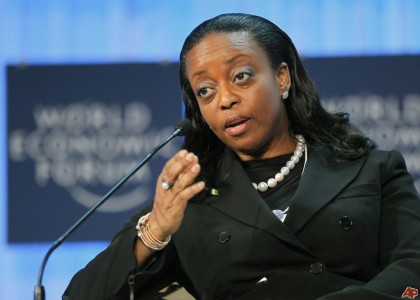
“The subsidy policy cannot be sustained any longer,” the minister said.
About a week after she told federal lawmakers that the federal government had no plans to remove subsidy on petrol, the Minister of Petroleum, Diezani Alison-Madueke, said on Tuesday that payment of subsidy on petrol ‘cannot be sustained any longer.’
Mrs. Alison-Madueke stated this at the ongoing Nigeria Oil and Gas Conference in Abuja.
“The continued regulation of the downstream sector has its positive and negative impact on the economy, but the negative effect is more than the positive,” the minister said.
“The subsidy policy cannot be sustained any longer.

“This is because the subsidy payment did not benefit the poor it was targeting, but rather it is benefiting the rich,” she added.
Mrs. Alison-Madueke said there was the need to deregulate the downstream oil sector to attract investors.
She said that in considering the deregulation of the downstream sector, government must strike a balance in implementing some of its policies to meet the needs of Nigerians.
“Now that reforms in power sector are underway, the next focus should be reforms in the downstream sub-sector.
“The industry needs to move to next level by increasing revenue and curb oil theft and pipeline vandalism,” she said.
Laments petrol scarcity
The minister admitted that Nigerians had been faced with petrol scarcity in the last two months and there seemed to be no end sight in spite of assurances by the Nigerian National Petroleum Corporation, NNPC, which she supervises
She blamed the current scarcity on sabotage, diversion, hoarding, panic buying and rumours of imminent pump price increase.
The current petrol scarcity in the country, and the minister’s statement on the urgent need to remove petrol subsidy, appears to buttress claims by Nigeria’s largest opposition party, the APC, that the federal government planned to use the scarcity as an excuse to remove petrol subsidy and thus increase the nationwide pump price of petrol.
Currently, the official pump price of petrol is N97 although filling stations in many states in Nigeria, where petrol is available, sell the product above the pump price; as high as N150 per litre.

Should the subsidy be removed, the pump price of petrol would increase to as high as N140 at filling stations.
Mrs. Madueke, while defending her ministry’s budget before lawmakers had denied plans to remove subsidy on petrol.
The petrol subsidy regime has been characterised by fraud and mismanagement in recent times, particularly under Mrs. Alison-Madueke’s supervision of the petroleum ministry.
Several government and parliament reports had shown that the 2011 petrol subsidy scheme was characterised by so much fraud that hundreds of billions of naira was schemed off the federal government by dubious petrol marketers, many of whom connived with petroleum ministry officials. Some of the culpable petrol marketers are currently being prosecuted. Calls for the removal of Ms. Alison- Madueke have been ignored by the president.
An indication of the government’s stance on the subsidy was also shown last week when state commissioners of finance met in Abuja. The commissioners, majority of who are members of Nigeria’s ruling Peoples Democratic Party, demanded the removal of the petrol subsidy. They also resolved to convince their governors and President Goodluck Jonathan to remove the subsidy. The APC, which controls 16 of Nigeria’s states, condemned the commissioner’s stance.

Mrs. Alison-Madueke also spoke about the Petroleum Industry Bill, PIB, at Tuesday’s conference.
PIB needed in oil industry
The minister outlined challenges confronting the government to include perennial oil theft, pipeline vandalism and non passage of the PIB.
“The PIB is still with the National Assembly and we hope that it will be passed very soon,” she said.
“However, we have been confronted with the menace of pipeline vandalism for decades and it has become much more prevalent in the last few years.
“In 2013 alone, all the major crude oil pipelines were severely damaged and vandalised at different points in time, the Bonny–Escravos line from the refinery was not spared either.
“Needless to say pipeline vandalism and sabotage created significant losses for the country; this includes direct and indirect costs for the provision of security, crude oil and petroleum products losses.
“Also production and environmental degradation and associated remediation cost to that and resulting escalation of project implementation cost that go along with it,” she said.
She said that in spite of these challenges, the country still maintained a stable 2.3 million barrels per day production of crude oil achieved in 2013.
The minister said that the country had the capacity to boost production to three million barrels per day.
She said that gas production had also increased from 6.3 trillion standard cubic feet per day to 8.1 trillion standard cubic feet per day in 2013.
(NAN)
No comments:
Post a Comment